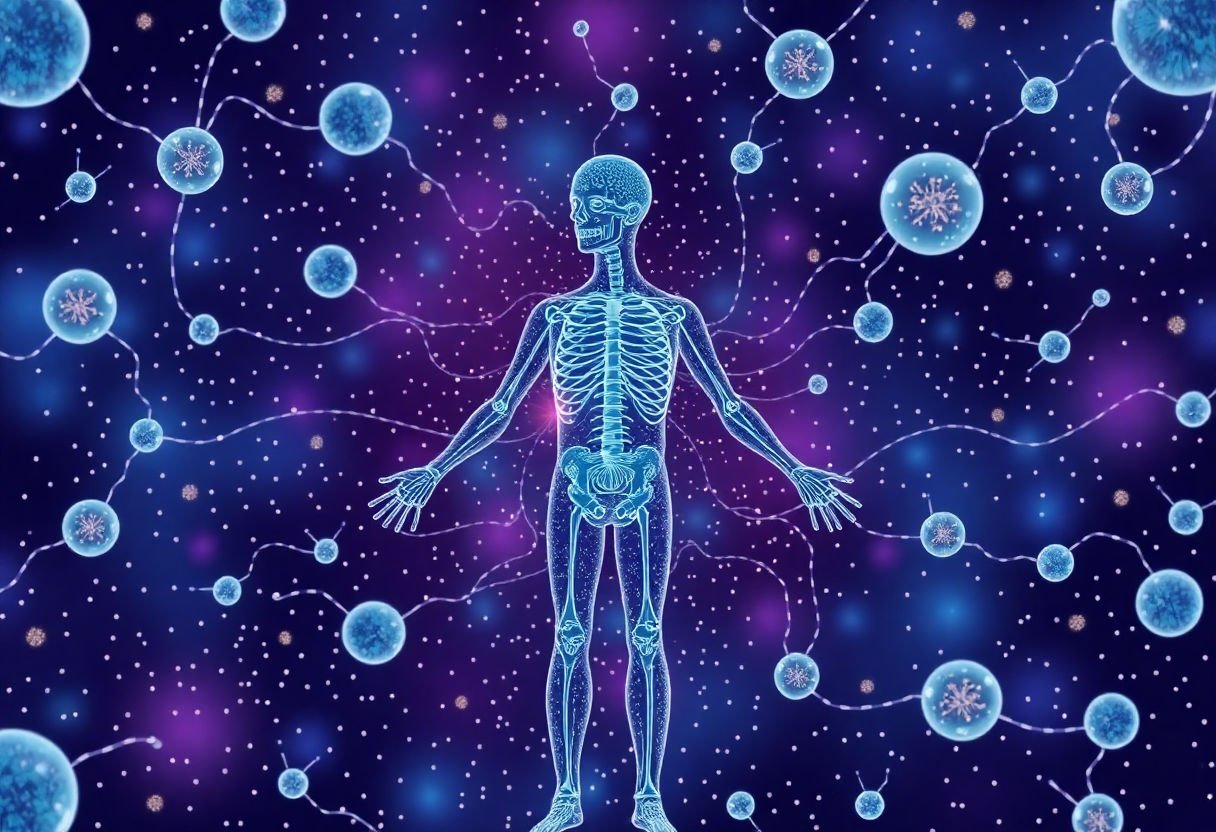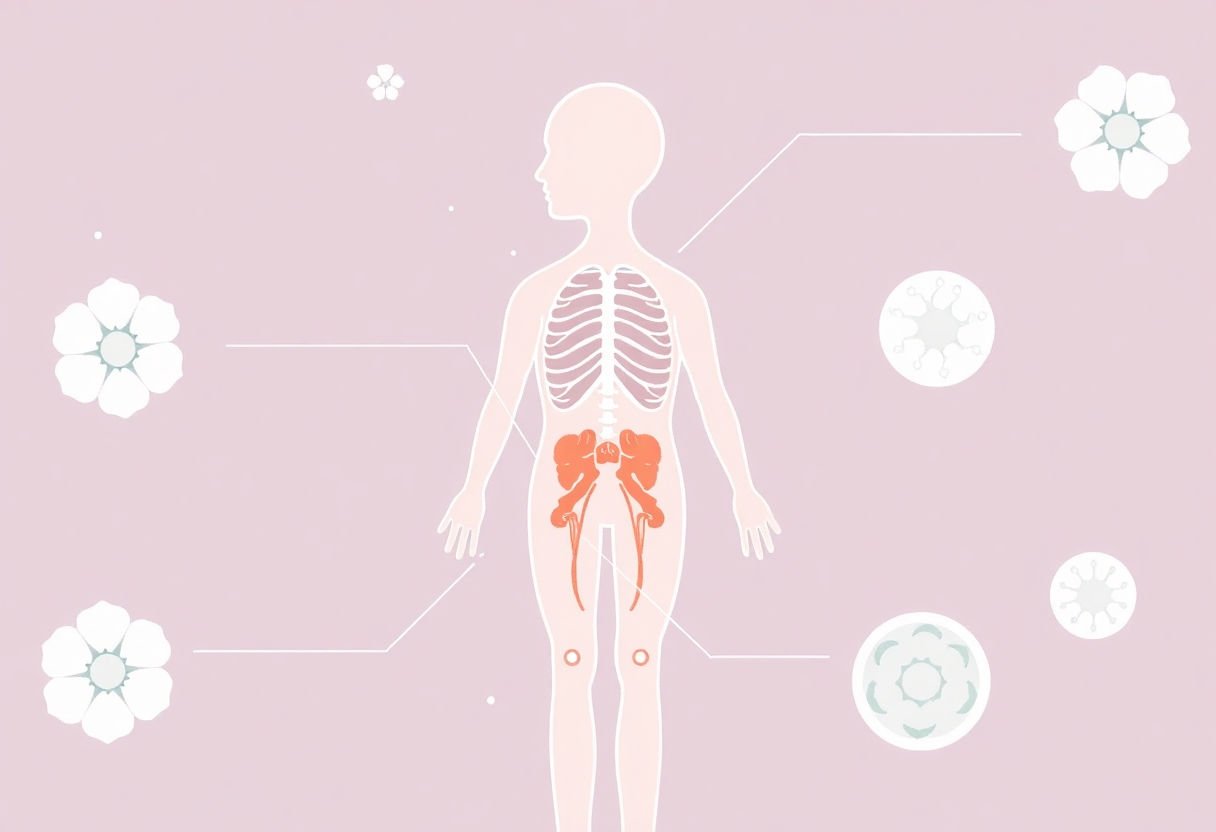In today’s fast-paced world, maintaining a proper balance of magnesium and potassium is essential for optimal health. These two crucial minerals play a significant role in various bodily functions, including muscle and nerve function, cardiovascular health, and cellular processes. This comprehensive guide delves into their vital roles, identifies rich dietary sources, and examines the symptoms of imbalance. It also highlights the importance of consulting healthcare professionals and explores when supplementation might be necessary. By understanding the interplay between magnesium and potassium, you can implement strategies to enhance your overall wellness and vitality.
Key Takeaways
- Magnesium and potassium are essential minerals that play crucial roles in maintaining cellular, muscular, and cardiovascular health.
- An imbalance of these electrolytes can lead to serious health issues, including muscle cramps, fatigue, and heart arrhythmias.
- Natural food sources, such as leafy greens, nuts, bananas, and avocados, provide vital magnesium and potassium.
- Proper balance can often be achieved through a consistent and varied diet, although supplementation may be necessary in some cases.
- Consulting healthcare professionals is essential when managing electrolyte levels, especially for individuals with pre-existing health conditions or those taking medications.
The Role of Magnesium in the Body

Magnesium is a crucial mineral involved in numerous physiological functions essential for maintaining optimum health. Cellular health is significantly influenced by magnesium, as it plays a vital role in the enzymatic activity necessary for DNA and RNA synthesis. This essential mineral is also a cofactor in over 300 enzymatic reactions, highlighting its importance in biochemical pathways that sustain cellular metabolism.
In terms of muscle function, magnesium is integral to muscle contraction and relaxation. A deficiency in magnesium can lead to muscle cramps and spasms, as it helps regulate the flow of calcium in muscle cells, ensuring proper contraction and relaxation cycles. Furthermore, magnesium’s contribution to electrolyte balance aids in maintaining muscle and nerve function, which is vital for physical activities and overall muscular health.
Magnesium is also essential for healthy neurological functions, as it impacts neurotransmitter release and synaptic plasticity, influencing mood and cognition. This makes magnesium indispensable for maintaining a balanced mood and supporting mental health.
Moreover, magnesium supports cardiovascular health by aiding in the regulation of blood pressure levels. It helps sustain the elasticity of the blood vessels, preventing hypertension. Additionally, magnesium’s role in glucose and insulin metabolism underscores its importance in heart health, as it influences insulin sensitivity and glycemic control.
In summary, magnesium is indispensable for numerous bodily processes, including enzyme function, muscle performance, neurological health, and cardiovascular wellness. Ensuring adequate magnesium intake is, therefore, crucial for maintaining overall physiological balance and health.
The Role of Potassium in the Body

Potassium is an essential mineral that plays a key role in maintaining various bodily functions. It is particularly vital for nerve function, as it assists in transmitting electrical impulses throughout the body. This process is crucial for efficient communication between nerves and muscles, impacting everything from reflexes to voluntary movements.
In addition to nerve function, muscle contractions rely heavily on potassium. Potassium and sodium work in tandem to conduct electrical signals that prompt muscle movement. An adequate level of potassium ensures that your muscles, including the heart muscle, can contract and relax properly. This is particularly important for athletes or individuals with active lifestyles, as potassium helps prevent muscle cramps and enhances overall physical performance.
Furthermore, potassium contributes significantly to cardiovascular health. It plays a role in maintaining optimal heart function and regulating blood pressure. Potassium aids in the dilation of blood vessels, which helps reduce the risk of hypertension. According to the American Heart Association, maintaining a proper intake of potassium through diet can be an effective strategy in managing blood pressure levels.
Beyond these vital functions, potassium assists in maintaining fluid balance within the body’s cells and tissues. It ensures that nutrient exchange and waste removal are conducted efficiently, supporting overall cellular health.
To meet the recommended dietary allowance, it’s advisable to consume potassium-rich foods such as bananas, potatoes, and avocados. Maintaining balanced potassium levels is a fundamental component of promoting long-term health and well-being.
Sources of Magnesium and Potassium
Magnesium and potassium are essential minerals that play crucial roles in maintaining various bodily functions. Ensuring a diet rich in these minerals is vital for optimal health. Here are some excellent natural sources of magnesium and potassium and ways to incorporate them into your daily meals.
Natural Sources of Magnesium
Magnesium is abundant in many plant-based foods, as well as some animal products. Key sources include:
- Leafy Greens: Spinach, kale, and chard are packed with magnesium and can be easily added to salads, smoothies, or sandwiches.
- Nuts and Seeds: Almonds, cashews, and pumpkin seeds provide a rich supply of magnesium, perfect for snacking or topping on yogurt and oatmeal.
- Whole Grains: Brown rice, quinoa, and whole wheat bread offer magnesium alongside other essential nutrients.
- Legumes: Black beans, chickpeas, and lentils are versatile ingredients high in magnesium that can be included in soups, stews, or salads.
- Fatty Fish: Salmon and mackerel not only contain magnesium but also provide beneficial omega-3 fatty acids.
Natural Sources of Potassium
Potassium is commonly found in fruits, vegetables, and dietary staples, such as:
- Bananas: Famous for their potassium content, bananas make a quick snack and are perfect in smoothies.
- Avocados: Rich in potassium, avocados can be added to salads, toast, or eaten as guacamole.
- Sweet Potatoes: These provide a substantial amount of potassium and can be roasted, mashed, or incorporated into casseroles.
- Tomatoes: Available fresh or in sauces, tomatoes add flavor and potassium to various dishes.
- Citrus Fruits: Oranges and grapefruits not only provide potassium but also boost vitamin C intake.
By diversifying your diet with these magnesium and potassium-rich foods, you can support your body’s essential functions and maintain a healthy balance of these vital minerals.
Symptoms of Imbalance
Recognizing the presence of magnesium and potassium imbalances in the body is vital for maintaining optimal health. Both deficiencies and excesses of these essential minerals can lead to noticeable symptoms that may disrupt daily life.
Magnesium Deficiency Symptoms
Magnesium deficiency, or hypomagnesemia, typically manifests as:
- Muscle Cramps and Spasms: Inadequate magnesium levels can result in frequent muscle cramps or spasms, commonly occurring in the legs.
- Fatigue and Weakness: Low magnesium can lead to unexplained fatigue and muscle weakness, affecting daily activities.
- Nausea and Vomiting: These are early symptoms that may progress to more severe issues if untreated.
- Apathy and Mood Disorders: Magnesium plays a role in neurological function, and deficiencies may lead to mood swings, irritability, or feelings of apathy.
Potassium Deficiency Symptoms
Potassium deficiency, known as hypokalemia, can present the following signs:
- Muscular Weakness and Cramps: Similar to magnesium, inadequate potassium can cause muscle weakness and cramps.
- Constipation and Abdominal Bloating: These may occur due to disturbances in the smooth muscles of the digestive tract.
- Palpitations: An irregular heartbeat or palpitations might suggest an imbalance affecting cardiovascular health.
Excess Magnesium and Potassium
Excessive levels, although less common, also pose health risks:
- Hypermagnesemia: May cause nausea, abnormally low blood pressure, and even cardiac issues if severe.
- Hyperkalemia: High potassium levels can lead to dangerous cardiac arrhythmias or nausea, which necessitates immediate medical attention.
Understanding these symptoms is crucial for timely diagnosis and corrective measures to restore balance and ensure overall wellness.
Balancing Magnesium and Potassium through Diet

Achieving the right balance of magnesium and potassium through diet is crucial for maintaining optimal health. Both minerals play complementary roles in supporting bodily functions, and a well-planned diet can help sustain their equilibrium.
To boost your magnesium intake, consider incorporating more leafy green vegetables like spinach and kale into your meals. These greens are rich in magnesium and also provide essential vitamins and fibers. Nuts and seeds, such as almonds and pumpkin seeds, are also excellent sources. Moreover, whole grains, including brown rice and quinoa, offer substantial amounts of magnesium and can be easily integrated into daily meals.
For potassium, focus on fruits such as bananas, oranges, and cantaloupes. Vegetables like potatoes, sweet potatoes, and mushrooms are also high in potassium, making them an excellent choice for a nutrient-rich diet. Legumes, including lentils and beans, provide both magnesium and potassium, making them a valuable addition to your dietary regimen.
Here are some dietary strategies to help maintain the balance:
- Diversify Your Plate: Ensure each meal includes a blend of magnesium-rich and potassium-rich foods.
- Monitor Sodium Intake: Excessive sodium can interfere with potassium balance, so moderating salt consumption is beneficial.
- Stay Hydrated: Adequate hydration aids in the metabolism and balance of these minerals.
Balancing these essential minerals requires thoughtful dietary choices but is essential for muscle function, nerve health, and overall well-being. By aligning your diet with these guidelines, you can effectively manage your magnesium and potassium levels.
Supplementation: When and How
Supplementation of magnesium and potassium can be a necessary measure when dietary intake falls short of meeting the body’s requirements. Identifying the need for supplementation typically involves recognizing symptoms such as muscle cramps, fatigue, or irregular heartbeats, which might indicate deficiencies. However, it’s crucial to confirm these needs with a healthcare provider before proceeding.
Timing and method of supplementation play a vital role in effectiveness. Magnesium supplements are often taken in the evening, as they can have a calming effect and may aid in sleep. Conversely, potassium is better consumed with meals to enhance absorption and minimize stomach irritation.
When choosing supplements, quality and dosage are paramount. Consumers should opt for high-quality, third-party tested products. The recommended daily allowance for magnesium generally ranges from 310 to 420 mg, while potassium requirements are around 2,500 to 3,000 mg. However, individual needs may vary based on factors like age, sex, and lifestyle.
Key Considerations for Supplementation:
- Magnesium forms: Magnesium citrate and magnesium glycinate are preferred for their high absorption rates.
- Potassium restrictions: High doses of potassium supplements can be harmful, and they should be administered under medical supervision.
- Monitor other medications: Be aware of interactions with medications, particularly for individuals with kidney disorders or those on diuretics.
Supplementing correctly ensures that the advantages, such as improved muscle function and electrolyte balance, are realized without adverse effects.
Interaction with Medications

Magnesium and potassium are two essential minerals that play significant roles in maintaining various bodily functions. However, their interaction with medications can lead to notable implications for health.
Medications such as diuretics, commonly prescribed to manage high blood pressure, can lead to potassium depletion. This is because diuretics increase urine production, causing excessive loss of potassium, which might need to be counterbalanced with potassium-rich foods or supplements.
For magnesium, certain antibiotics like tetracyclines can bind with the mineral, resulting in decreased absorption and effectiveness of the antibiotic. It’s advised to consume magnesium supplements or magnesium-rich foods several hours before or after taking these medications.
Additionally, antacids and some laxatives, which contain magnesium, can lead to elevated magnesium levels when taken in excess, potentially causing diarrhea, nausea, and even heart irregularities in severe cases.
On the other hand, medications such as Angiotensin Converting Enzyme (ACE) inhibitors, which are often used to treat cardiovascular conditions, can increase potassium levels in the body. Patients on ACE inhibitors should monitor their potassium intake to avoid hyperkalemia, a condition characterized by excessively high potassium levels that can disrupt cardiac functionality.
Lastly, individuals on medications impacting kidney function must manage their calcium, magnesium, and potassium levels with caution. Consulting healthcare professionals for advice is crucial to avoid adverse interactions and maintain optimal electrolyte balance. This personalized approach ensures that both medication efficacy and nutritional health are upheld.
Consulting Healthcare Professionals

Consulting healthcare professionals is a critical step in effectively managing magnesium and potassium balance, particularly for individuals with underlying health conditions. Personalized medical advice ensures that any potential deficiencies or excesses are properly addressed, minimizing health risks.
Healthcare providers can conduct thorough assessments, employing blood tests to determine precise electrolyte levels. These tests provide a comprehensive view, allowing professionals to evaluate whether dietary adjustments, lifestyle changes, or medication interventions are necessary. For those with conditions such as kidney disease, heart disorders, or diabetes, professional supervision is essential to avoid complications from inappropriate electrolyte management.
In addition to diagnosis, healthcare professionals can offer tailored recommendations on dietary modifications or supplementation, ensuring these align with any medication regimens. They can elucidate potential interactions between magnesium and potassium and commonly prescribed medications, such as diuretics or heart rhythm stabilizers, which can impact electrolyte balance. It’s important to note that overconsumption or inappropriate use of supplements can lead to adverse effects, underscoring the need for guidance from a trusted healthcare provider.
Monitoring and follow-up appointments with healthcare professionals are also vital for long-term management. Continuous assessment allows for adjustments based on changing health statuses or new developments in medical treatments. By consulting with healthcare providers, individuals can obtain an informed plan tailored to their unique health needs, ensuring a balanced and safe approach to managing magnesium and potassium levels efficiently.
Conclusion
Maintaining the right balance of magnesium and potassium is vital to your overall health, influencing everything from cellular function to cardiovascular health. By integrating natural food sources and cautious supplementation, you can address deficiencies effectively. Future advancements in dietary science may provide even more insightful ways to manage electrolyte balance. It is advisable to consult healthcare professionals for personalized guidance, particularly if using medications that could affect these essential nutrients. Embrace a proactive approach towards monitoring and balancing electrolytes, as it lays the foundation for a healthier and more vibrant life.
Frequently Asked Questions
What is the optimal daily intake of magnesium and potassium for adults?
For most adults, the recommended daily intake is about 400-420 mg of magnesium and 2,600-3,400 mg of potassium. These values ensure adequate support for metabolic and physiological functions.
How can I naturally boost my magnesium and potassium levels through diet?
Incorporate foods rich in magnesium, such as nuts, seeds, spinach, and whole grains. For potassium, focus on fruits like bananas and oranges, vegetables like spinach and potatoes, and beans and legumes.
What are the signs of magnesium and potassium deficiency?
Common signs of deficiency include muscle cramps, fatigue, weakness, and abnormal heart rhythms. A persistent imbalance may require medical assessment.
Can taking supplements cause an imbalance in magnesium and potassium levels?
Yes, excessive supplementation can lead to an imbalance, causing symptoms like diarrhea, nausea, or high potassium levels. Always consult a healthcare professional before starting supplements.
Are there specific medical conditions that affect magnesium and potassium balance?
Yes, conditions like kidney disease, diabetes, and certain heart disorders can impact electrolyte balance, necessitating careful monitoring and management.
